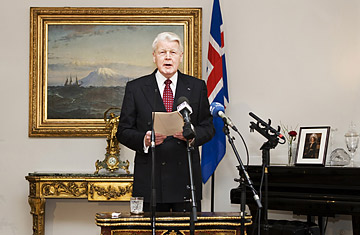
Iceland's President, Olafur Grimsson, speaks during a news conference in Reykjavik
Hundreds of years ago, Icelanders entertained one another with Viking sagas — epic, blood-curdling tales about the raiding and pillaging of foreign lands. Today, there are new sagas being told on the craggy island about the greedy attempts by two foreign powers, Britain and the Netherlands, to pry every last krona from Iceland's shattered economy in order to repay debts incurred during the financial meltdown. The rift that's developing between Iceland and its European neighbors is threatening to leave the island isolated — and could even destroy its hopes of finally joining the European Union.
Iceland took a dramatic stand in the conflict last week when President Olafur Grimsson refused to sign a bill requiring his country to repay the $5 billion that's owed to the British and Dutch citizens who deposited their savings in an online Icelandic bank that collapsed in 2008. Icesave, a subsidiary of the Icelandic bank Landsbanki, offered eye-popping interest rates of up to 15% to foreigners before the crash.
Although Grimsson insists that Iceland will repay the debt — which amounts to about one-third of Iceland's annual output, or $17,400 per Icelander — he says the British and Dutch governments are trying to bully the country into accepting an extortionate interest rate of 5.55% over 15 years. He called for a referendum, set for Feb. 20, on whether the country should accept the repayment plan.
Britain and the Netherlands reacted angrily to Grimsson's move, warning that Iceland's economic recovery and bid to join the E.U. would be doomed if it failed to meet its obligations. British Financial Services Minister Paul Myners even said the country risks becoming a pariah state. Both Britain and Holland hinted that they may block a $10 billion International Monetary Fund rescue package for the country, and Iceland's Scandinavian neighbors shelved a $2.6 billion loan they had promised Reykjavik. On top of all that, Fitch Ratings lowered Iceland's credit grade to junk status last week.
Iceland's defiance goes to the heart of the debate about what caused the country's stunning economic collapse — and who has to pay in the aftermath. Critics say Iceland has only itself to blame: the sparsely populated island had a mainly fish-based economy until the early 2000s, when it deregulated its banks and tried to reinvent itself as a global financial power — with disastrous results. Banks such as Landsbanki moved aggressively into European markets and racked up incredible debts — partially because of poor government oversight — which they were then unable to refinance.
But many Icelanders say they are being unfairly persecuted. They are still smarting from Britain's decision to use antiterrorism laws in 2008 to freeze Iceland's assets and force the country to agree to reimburse the British savers. "The British government used gunboat diplomacy, putting us in the same category as al-Qaeda and the Taliban," says Magnus Arni Skulason, a founding member of InDefence, a grass-roots campaign that helped secure 62,000 names — over a quarter of Iceland's 320,000 people — on a petition calling for the referendum. Skulason says Iceland has become the whipping boy in the financial meltdown. "Yes, there was a regulatory problem in Iceland. But this is a joint responsibility: the financial authorities in the U.K. and the Netherlands should have been overseeing it too," he says.
Andre Sapir, a senior fellow at Bruegel, a Brussels-based economic think tank, is also sympathetic. "The rules on sovereign debt and banking are slightly fuzzy," he says. "The best way to resolve this would have been with arbitration through an impartial court, but the U.K. and the Netherlands refused." The country of Latvia, which suffered its own monumental economic collapse last year, says that Iceland is being ganged up on because of its size and relative unimportance. "Is this reaction due to the fact that Iceland is a small country?" Latvian Foreign Minister Maris Riekstins asked on Jan. 7. "It is difficult to imagine that similar comments would be heard if, for example, such a step had been taken by the French President." Iceland has also garnered the support of the Jubilee Debt Campaign, a British antipoverty organization. "Iceland's President was correct to assert that states in debt have rights that trump the rights of creditors to bleed their economies dry," says Nick Dearden, the group's director.
Other analysts say that Iceland's future may not be as imperiled as the British and Dutch suggest. "When you have a debtor who cannot repay immediately, what do you do? Do you beat Iceland to pieces? If you do, the chances of getting the money back goes down the drain," says Daniel Gros, director of the Centre for European Policy Studies in Brussels and a board member of the Central Bank of Iceland. "The U.K. and Netherlands may feel that it would be easier to be repaid if Iceland is in the E.U."
In the end, Iceland may cave in to the international pressure. The latest opinion polls suggest a softening of hostility toward the repayment scheme, with 53% of Icelanders against it, down from about 70% last month. This could reflect recent appeals by Prime Minister Johanna Sigurdardottir, who is at loggerheads with the President and says the deal is essential for Iceland's recovery. But if Icelanders fall back on the Viking tradition of bold defiance and vote against the plan, this could be one long saga indeed.
